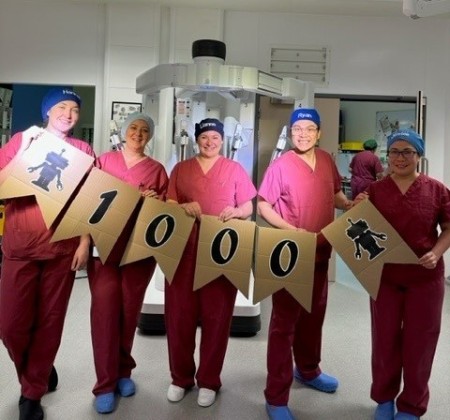Publish date: 11 December 2023
Northumbria Healthcare celebrates milestone 1,000th robotic operation

More than 1,000 patients have benefitted from reduced recovery time and risk since the arrival of two robotic surgery units at Northumbria Healthcare.
The trust introduced the state-of-the-art Da Vinci system at Northumbria Specialist Emergency Care Hospital and North Tyneside General Hospitals in September 2021, investing more than £3.7million in the two units.
Surgeons use robotics to create more consistent and accurate results than traditional approaches. In open surgery, clinicians operate with handheld instruments through a large incision, but robotic surgery allows for operations to be carried out by making small cuts and inserting specialist equipment.
Procedures are carried out by a surgeon seated at a console connected to a robot. The surgeon then directs the robotic arms, which mimic their hand movements, in real-time. This method utilises 3D imaging that allows surgeons to be more precise in their movements than the 2D visuals offered by other keyhole surgery methods.
Robotic-assisted surgery provides multiple benefits to patients, including quicker and easier recovery, reduced chances of complications, and shorter hospital stays. Surgeons benefit from operating at a seated station in a more ergonomic position, reducing stress on their body through what can be lengthy and complex procedures.
Comments gathered by the trust’s extensive patient feedback programme continue to be overwhelmingly positive: “I would recommend RAS [robotic-assisted surgery] to anybody as it was so great, and I have told everyone I meet about it. It has given me such a better quality of life; in fact, it has changed my life.”
The 1,000th procedure was a complex hysterectomy completed by Mr Ibrahim Hamoodi, an obstetric and gynaecological consultant.
“Robotic surgery offers a significant advantage over traditional procedures for surgeons and clinicians," he said. "By using a robot, we offer patients a much more precise and efficient surgery that reduces pain, risk, and recovery time.
“The less invasive nature of the procedure means that patients can make a quicker recovery, which reduces the risk of complications. It also means that patients don’t require an overnight stay and can be discharged on the same day. This allows the patient to return to the comfort of their home as soon as possible and creates more bed space on our wards.”
Kirsty Sewell, robotic surgery coordinator, added: “Northumbria Healthcare made a significant financial commitment purchasing this technology and we’re now seeing the benefits of it. Patients across Northumberland and North Tyneside can now access safer and more efficient surgery that improves their experience.
“1,000 surgeries in just over two years is a great achievement for our team and the trust as a whole. This milestone is a reminder of the patients we have treated and the lives we have touched since the introduction of robotic surgery. We look forward to continuing the robotics programme and improving patient experience by continuing to use new technologies.”
For more information about robotic-assisted surgery at Northumbria Healthcare, visit our website.
Media Contact
Christopher Magee, marketing and communications officer, Northumbria Healthcare
Christopher.Magee@northumbria-healthcare.nhs.uk
